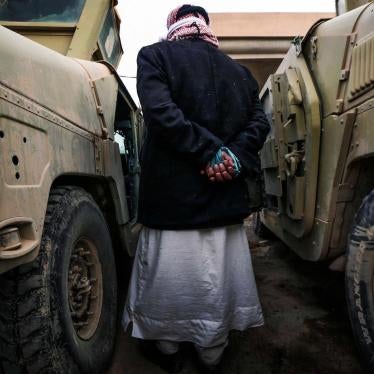Dear Members of the Tunisian National Constituent Assembly,
Human Rights Watch, an independent, nongovernmental organization, is writing to urge you to amend the 2003 counterterrorism law that risks undermining human rights.
Provisions that cause concern include an overly broad and vague definition of terrorism that includes acts of violence that could “disturb the public order” and “bring harm to persons or property”. Vague terminology on incitement to commit a terrorist act means persons can be prosecuted if they employ a term or symbol that is deemed supportive of terrorism, regardless of whether doing so results in any concrete act. It also violates the right of a suspect to mount an effective legal defense by making it a crime for a lawyer not to provide authorities with "information relating to any terrorist activity,” even if he or she is bound by professional confidentiality.
Under Ben Ali, the authorities prosecuted well over 3,000 individuals under the counterterrorism law since it took effect in December 2003.
Human Rights Watch urges the Tunisian authorities not to use the broad invoking of national security concerns as a justification for curtailing fundamental rights of defense.
Overly broad definition of terrorism
Human Rights Watch is concerned by the definition of terrorism that is too broad – that label, or could easily be used to label, acts of peaceful expression, association and assembly as terrorist and therefore criminal actions.
Some Security Council resolutions have directed states to ensure that counterterrorism measures comply with international human rights law. Among the most important of these is Resolution 1456 of 2003, which calls on states to “ensure that any measure taken to combat terrorism comply with all their obligations under international law... in particular international human rights, refugee, and humanitarian law.”
International human rights law requires crimes to be clearly and specifically defined.
The 2003 law does not conform to this obligation. Article 4 defines a terrorist act as:
…[a]ny infraction, whatever the motive, in relation with an individual or collective enterprise liable to terrorize a person or a group of persons, to sow terror amidst a population, with the design of influencing the policies of the state, to force it to do what it does not intend to do or to refrain from doing what it intends to do; to disturb the public order, peace or international security, to bring harm to persons or property, to damage buildings housing diplomatic missions, consulates, or international organizations, to cause serious harm to the environment, in a way that would endanger the lives or the health of residents, or to bring harm to vital resources, infrastructure, or means of transport or of communication, information systems or public services.
This legal definition of terrorism is so vague and open-ended that it fails to give reasonable notice of what actions are covered. It is broad enough to cover acts that should not reasonably be deemed criminal, such as peaceful demonstrations, and their broad scope leaves them susceptible to arbitrary and discriminatory enforcement. Under this definition, a demonstration by truck drivers that temporarily blocks a major road could be classified as a terrorist act.
Nor does the Tunisian law’s definition of terrorism require the intention of resorting to deadly or otherwise serious physical violent means against a population, or the intention of taking of hostages, which the UN Special Rapporteur on the promotion and protection of human rights and fundamental freedoms while countering terrorism (hereinafter Special Rapporteur) has designated to be the central elements of a terrorist act.
Vague notion of “incitement to terrorism”
The law also provides too broad a definition of incitement to commit terrorist acts. Article 11 includes as acts of terrorism “incit[ing] or consult[ing] with others in order to commit a terrorist act, or resolv[ing] to commit one, when that resolve is accompanied by a preparatory act with a view toward its execution.”
Article 12 imposes prison terms of five to 12 years and a fine on anyone who: …[c]alls for the commission of terrorist infractions, or to join an organization or to enter into an agreement related to terrorist infractions, or uses a name, a term, or a symbol or any other sign in order to justify a terrorist organization, or one of its members or its activities.
These articles could be used to penalize individuals or groups for legitimate freedom of expression. For example, persons risk imprisonment if they employ a term or symbol that is deemed supportive of terrorism, regardless of whether doing so results in any concrete act.
The UN Human Rights Committee, in its general comment on the ICCPR’s article 19, wrote: States parties should ensure that counterterrorism measures are compatible with paragraph 3 [of article 19]. Such offences as “encouragement of terrorism” and “extremist activity” as well as offences of “praising”, “glorifying”, or “justifying” terrorism, should be clearly defined to ensure that they do not lead to an unnecessary or disproportionate interference with freedom of expression.
A balanced and human rights response to incitement to terrorism, according to the Special rapporteur, is to expressly require both a specific intent to incite the commission of a terrorist act and a concrete danger of this act being committed as a result of incitement.
Overly broad notion of “belonging to a terrorist organization”
Article 13 of Tunisia’s counterterrorism law allows prison terms of five to 12 years for:
…[b]elonging to an organization or entity, whatever its form and the number of its members, which has, even if coincidentally or incidentally, used terrorism as a means of action in the realization of its objectives.
Another concern is the phrase “coincidentally or incidentally,” particularly when coupled with the overly broad definition of terrorism; there is no requirement that the accused was aware of the terrorist nature of the organization or intended to adhere to an organization involved in terrorism. This crime also encompasses those who were members of a very large group, and/or members of a group that has used ‘terrorism’ only ‘coincidentally or incidentally’. In both cases individuals can be sentenced to long terms in prison despite having not been shown to have had any role in a terrorist act.
Articles 14-18 criminalize, among other acts, the housing or hiding of terrorists, helping terrorists escape, providing terrorists with meeting places, and training or lending expertise to terrorists. The provisions do not require proving criminal intent on the part of the person housing or otherwise helping the terrorist.
Articles that Undermine Defendants’ Right to Mount a Fair Defense
The counterterrorism law restricts various rights that defendants ordinarily enjoy under the Code of Penal Procedure, thereby undermining their right to a fair trial. Article 22 imposes one to five years in prison and a fine on “anyone, even those bound by professional secrecy, who did not immediately inform the relevant authorities of the facts, information, or intelligence relative to terrorist infractions about which they had knowledge.” Only family members are exempt.
This provision of the counterterrorism law applies to professionals normally bound by confidentiality, such as defense lawyers, medical workers, or clergy. This risks jeopardizing the internationally guaranteed right to health, as well as the right to lawyer- client confidentiality that is a key component of the internationally guaranteed right to a fair trial. This provision should either be eliminated or revised to recognize exemptions for lawyers, clergy, and medical workers.
The counterterrorism law contains provisions allowing for witnesses to testify outside the presence of the accused and to withhold their identity. While such provisions are permissible in narrowly defined circumstances, the broadly written provisions in this law violate the fundamental right of defendants to “equality of arms,” which entails the possibility of examining their accusers, and challenging their testimony—which may weigh heavily in the court’s verdict— and their motives in testifying.
Recommendations
In order to safeguard human rights in the efforts to counterterrorism, Human Rights Watch urges the NCA to revise the 2003 law or adopt a new law that will contain the following elements:
- Narrow the overly broad definition of a “terrorist” offense, so that a prerequisite condition be that the offense involves the intention of taking hostages or of using deadly or otherwise serious physical violence against a population, for the purpose of provoking a state of terror, intimidating a population, or compelling a government or international organization to do or abstain from doing any act, as per the recommendations of the Special Rapporteur.
- Narrow its broad definitions of “incitement to terrorism” to expressly require both a specific intent to incite the commission of a terrorist act and a concrete danger of this act being committed as a result of incitement.
-
Eliminate the many provisions that compromise the right of defendants charged with terrorist offenses to mount an adequate defense, such as:
- Articles that permit, broadly rather than exceptionally, witnesses to testify without being physically present before the defendants, or their identities being disclosed to the defendants. The law should allow the names of witnesses to be kept confidential only in exceptional circumstances. To ensure respect for due process and the right to defense, judicial authorities should always make the names available in confidence to the defendants and their counsel, except in the most extreme circumstances, when specific danger to the witness has been proven and after exhausting other means of protecting the witness that do not undermine defendants' rights, and having assessed the overall duty to ensure a fair trial, including that a defendant can challenge the key evidence and witnesses against him or her.
- Articles concerning confidentiality that do not recognize the special status of lawyers vis-à-vis their clients and do not exempt them from criminal penalties imposed on persons who know of terrorist acts as defined by the law and who fail to report them to authorities.
Overall, the law should avoid derogations from the normal framework applicable in Tunisia for detention, including by putting a person in administrative or preventive detention for security reasons, or investigative detention. It should avoid extension of the period of pre-trial detention. Deviations from ordinary criminal proceedings should not result in hampering key fair trial guarantees.The law should also state that no statements or confessions or other evidence obtained under torture or other degrading treatment or punishment may be invoked as evidence in any proceedings, except when a statement or confession is used as evidence that torture or other treatment prohibited by the provision has occurred. The procedural rulesaimed at the protection of witnesses and collaborators of justice should ensure that the balance necessary in a democratic society is maintained between the prevention of crime, the needs of the victims and witnesses and the safeguarding of the right to a fair trial[1].
We thank you for your time and attention.
Sincerely,
Sarah Leah Whitson
Executive Director
Middle East and Northern Africa Division
Human Rights Watch
[1]Council of Europe, Recommendation Rec(2005)9 of the Committee of Ministers to member states on the protection of witnesses and collaborators of justice https://wcd.coe.int/ViewDoc.jsp?id=849237&Site=COE








